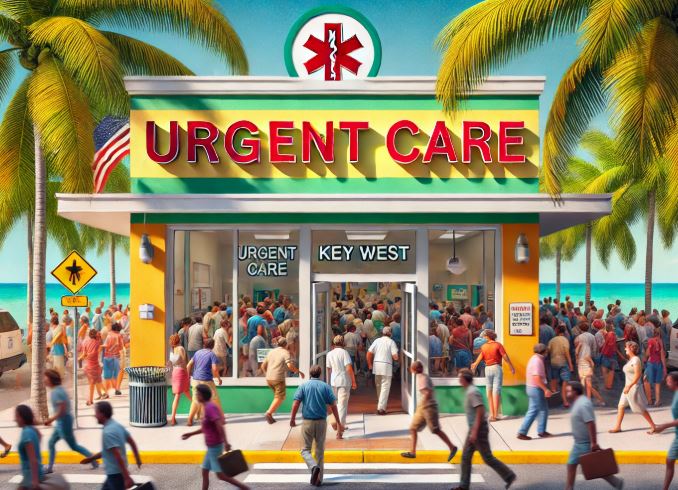Share this post
Understanding the “Monday Morning Rush” in Urgent Care According to Dr. Jason Pirozzolo
The phenomenon known as the “Monday Morning Rush” is a well-documented reality for urgent care centers across the country. Mondays consistently see the highest patient volumes, largely due to individuals delaying medical attention for injuries or illnesses over the weekend. Dr. Jason Pirozzolo, a leading expert in urgent care medicine, provides insights into this trend and emphasizes the importance of timely care to prevent complications.
“Most importantly, waiting too long to address health concerns can lead to worsening symptoms and more complicated treatment needs,” explains Dr. Jason Pirozzolo. This behavior often stems from a mix of optimism and convenience. People hope their condition will improve without intervention and prefer to avoid visiting a clinic during their weekend downtime. However, when Monday arrives, symptoms that persisted or worsened become unavoidable, driving a surge in urgent care visits.
The weekend poses unique challenges for individuals managing unexpected health issues. Many primary care offices remain closed, leaving fewer options for treatment. While some people manage minor issues with over-the-counter remedies or rest, others may be unaware that certain conditions require urgent attention. According to Dr. Jason Pirozzolo, this delay can be particularly risky. “Conditions like urinary tract infections, sprains, or respiratory illnesses can escalate if not treated promptly,” he says.
Urgent care centers prepare for the Monday rush by increasing staff and streamlining patient intake processes. The goal is to minimize wait times and ensure that all patients receive appropriate care. Common reasons for Monday visits include sports injuries from weekend activities, lingering flu-like symptoms, and untreated minor traumas like cuts or burns. “Understanding these patterns helps us provide better care and anticipate patient needs,” explains Dr. Jason Pirozzolo.
Delayed care also has implications for overall health. Untreated injuries, such as sprains or strains, can lead to long-term complications, including chronic pain or limited mobility. Similarly, respiratory infections may progress to more severe conditions like pneumonia. Dr. Jason Pirozzolo advises, “If symptoms persist beyond 48 hours or significantly worsen, seeking medical attention right away can make a significant difference.”
Besides delayed care, lifestyle factors contribute to the Monday spike in patient visits. Weekends are often filled with physical activities like sports, hiking, or home improvement projects, which increase the risk of injury. Additionally, indulgent eating or drinking during social events may exacerbate underlying health conditions. “The body needs rest and balance, especially when recovering from illness or injury,” emphasizes Dr. Jason Pirozzolo.
Preventing the Monday Morning Rush requires a proactive approach to health. Dr. Jason Pirozzolo recommends taking precautions during physical activities to avoid injuries, such as wearing protective gear and warming up properly. He also encourages individuals to monitor their symptoms closely over the weekend. “Recognizing early signs of trouble and addressing them promptly can reduce the need for urgent care visits,” he says.
Advancements in telemedicine provide additional options for weekend care. Virtual consultations allow patients to discuss symptoms with a healthcare provider and determine whether in-person care is necessary. “Telemedicine bridges the gap when access to urgent care is limited,” explains Dr. Jason Pirozzolo. This convenience is particularly beneficial for managing minor issues or seeking guidance on next steps.
The psychological aspect of delaying care also deserves attention. Many individuals feel hesitant to prioritize their health, fearing they might be overreacting or burdening healthcare providers. Dr. Jason Pirozzolo stresses the importance of reframing this mindset. “Your health is never an inconvenience,” he says. “Early intervention often prevents more serious complications, saving time and effort in the long run.”
For urgent care centers, understanding the Monday Morning Rush means more than managing patient volume. It provides an opportunity to educate the public on the importance of timely care and preventive measures. By addressing the root causes of delayed visits, healthcare providers can empower individuals to take control of their health.
The Monday Morning Rush is more than a scheduling anomaly—it reflects broader trends in how people approach their health. From injuries sustained over the weekend to delayed care for worsening symptoms, the phenomenon highlights the importance of education and accessibility in healthcare. “Empowering patients with the tools and knowledge to manage their health effectively benefits everyone,” concludes Dr. Jason Pirozzolo.
For more insights into injury prevention, trauma care, and advancements in modern medicine, follow Dr. Jason Pirozzolo. His expertise can help you navigate the path to better health and recovery. You may also contact a Key West orthopedic clinic for more information.




















